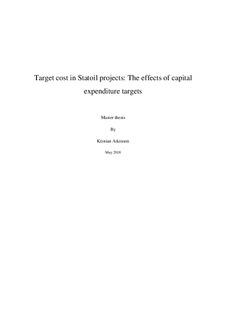| dc.contributor.advisor | Kjøde, Lars Atle | |
| dc.contributor.author | Atkinson, Kristian | |
| dc.date.accessioned | 2018-10-17T13:12:45Z | |
| dc.date.available | 2018-10-17T13:12:45Z | |
| dc.date.issued | 2018-05 | |
| dc.identifier.uri | http://hdl.handle.net/11250/2568513 | |
| dc.description | Master's thesis in Business administration: Executive MBA | nb_NO |
| dc.description.abstract | This paper consists of an explorative investigation into the effects of the concept “target cost” in development projects executed by the Norwegian energy company Statoil ASA. Target cost is a financial target towards capital expenditure implemented in all major development projects in the researched company in order to increase performance and lower costs. An exploratory approach using a qualitative investigation based on interviews of six project directors examined this concept in detail. The aim of this research was to gain a deeper insight into the effects of having a financial target in the execution phase of offshore construction projects. Five objectives were formulated, consisting of; how target cost effects projects, why target cost motivates, when target cost is effective, who is effected, and finally if the target cost has an effect on reducing project expenditure. The interviews provided a wide range of results consistent with existing goal theory and associated literature. Some of the findings were however, not expected prior to the interviews.
Target cost was found to be associated with several positive effects identified through secondary research. In addition, unexpected findings such as the disciplining effect of target, the communicating effect and cultural effect were identified. A range of positive emotions towards target cost and target attainment were recognised, indicating high levels of intrinsic motivation as a reason why individuals’ behaviour may be effected. Increased focus on target cost by management, was suggested to increase perceived importance of target cost in the remaining project organisation. Findings also suggest that as a result of introducing beyond budgeting, a higher focus on cost and a discontent with overspending occurred. The findings indicate a shift from budget based comfort zones to beyond budgeting based stretch zones. Target cost efficacy was found to be effected by a range of situational factors. Some of the central findings suggest that culture is also a prerequisite for target effectiveness as well as an effect of the target. Other findings indicate development and control of uncertainties as important towards individuals’ perception of attainability of target cost. Inconsistent opinions regarding the level of difficulty towards achieving target cost were noted, suggesting target cost to be recognised as a difficult goal rather than a stretch target. Finally, there is a consistent belief among project directors that target cost reduces capital expenditure. Implementing findings from the previous objectives into Locke and Latham’s (2002) High Performance Cycle supports and reinforces the interviewees statements. | nb_NO |
| dc.language.iso | eng | nb_NO |
| dc.publisher | University of Stavanger, Norway | nb_NO |
| dc.relation.ispartofseries | Masteroppgave/UIS-HH/2018; | |
| dc.rights | Navngivelse 4.0 Internasjonal | * |
| dc.rights.uri | http://creativecommons.org/licenses/by/4.0/deed.no | * |
| dc.subject | økonomi | nb_NO |
| dc.subject | administrasjon | nb_NO |
| dc.subject | strategisk økonomistyring | nb_NO |
| dc.title | Target cost in Statoil projects: The effects of capital expenditure targets | nb_NO |
| dc.type | Master thesis | nb_NO |
| dc.subject.nsi | VDP::Samfunnsvitenskap: 200::Økonomi: 210::Bedriftsøkonomi: 213 | nb_NO |

